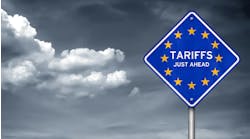Hong Kong-based watchmaker Peace Mark Holdings (www.peacemark.com) is representative of a trend in Hong Kong but an exception in China.
Like many other manufacturers, Peace Mark moved its manufacturing to China, to the Shenzhen special economic zone and to Shanghai.
Hong Kong lost over 1 million manufacturing jobs in recent years as manufacturing companies took advantage of cheaper labor in Mainland China and new regulations that make it easy for a Hong Kong company to move into China. The Closer Economic Partnership Arrangement (CEPA) eased the rules for Hong Kong companies to expand into China and, according to a number of Hong Kong business and economic leaders, has been very beneficial to Hong Kong and to their companies. Peace Mark is one of those companies.
But Peace Mark differs from the perceptions (and experience) many have of China-based manufacturing. One reason is that Tommy Leung, managing director, had not only a strong commitment but also a clear vision to build a leadingedge factory for a best-in-class company. "Everything we do, we will do the best," Leung asserts. Innovation dominates in factory design, operations, product and management.
Those are big claims for a company manufacturing in China, where a common image and all-too-common experience is that quality and performance are often inconsistent. But a steady stream of visitors have reinforced Leung's view that Peace Mark is out in front, and he intends to keep it there.
Among the more notable visitors are groups of Swiss and Japanese watchmakers and engineers. Does it bother Leung to show competitors what he's doing? "No," he says. He wants to see the industry move forward and knowing his partners and his competitors can share in some of Peace Mark's innovations only drives him on, spurring him to look for new innovations to maintain his lead.
Peace Mark is vertically integrated, Leung explains. From components to finished product, everything is made in house. The watchmaker also builds components for Swiss companies and assembles some high-end Swiss watches for those companies using Swiss-supplied movements and Peace Mark components and labor.
Founded in 1983, Peace Mark became the largest watchmaker in Hong Kong. Margins on manufacturing were limited, even after moving to Shenzhen, says Leung, so in 2000 the company expanded into distribution and retail. That move was facilitated when CEPA was signed by Hong Kong and Mainland China. CEPA allowed certain Hong Kong firms to enter China for distribution and retail, and that's just what Peace Mark did in 2004. By 2005, Peace Mark was the largest watch retailer in China, with 620 distribution points — 80% in first-tier cities.
It had also begun international expansion with 10 retail points in Hong Kong and will have 20 points in Taiwan and sites in France (its first site has already opened in Paris).
Within the next 10 years, Peace Mark's goal is to become one of the world's largest watchmakers.
For the U.S. market, Peace Mark has a 51% stake in its business partner in New York. Some of the 26,000 points of sale across the U.S. are through direct imports to customers like Wal-Mart Stores. China is the only market where Peace Mark has adopted a strategy of manufacturing, distribution and retail without relying on any middlemen.
Function followed form for Peace Mark as fashion shifted to more multifunction mechanical watches. That led Peace Mark to acquire a state-owned movement factory in China. Leung points out that Peace Mark needed a controlling interest in order to change the factory model - its operations and management. It converted the assembly plant, modernized it and saw significant improvements in productivity and quality.
It's more than pride that makes Leung open his plant to visitors. The plant has a number of environmental controls to ensure it doesn't pollute. It has generator power so it can operate smoothly despite the instability of the power grid in Shenzhen (the power grid is one of the infrastructure victims of rapid growth). Peace Mark's project manager and chief architect Joseph Leung takes visitors into the grinding operation and demonstrates by running a finger along a surface that even their dirtiest task is performed to the highest standards for quality and cleanliness.
Workers live in dormitories adjacent to the factory with four or more to a room (room sizes vary). Peace Mark had begun building a new cafeteria for workers along with expanded recreation and community areas. Managers had a separate living area.
The company places a lot of stock in its employees. It has a code of conduct that includes a high ethical standard: "Employees at all levels are expected to conduct themselves in an honest, diligent and responsible manner."
The skilled work that takes place at Peace Mark's plants requires significant amounts of training. Moving into the retail arena, Peace Mark had to develop repair and service centers to serve its customers. There was no program in China to produce the skilled technicians to operate the centers, so Peace Mark had to work cooperatively with the provincial government to develop a training program that would provide a technical certificate or diploma that would be recognized throughout China.
The goal, says CEO Leung, was to provide useful and educated technicians for China. It's something Peace Mark felt it should do because "we are industrialists in China. We make money in China, and we should also do something for China's society."
In the end, Peace Mark has set the bar high for its manufacturing, training and business practices as well as its role in the community and its impact on the environment. Leung clearly wants that to be the company's creed, but he also wants to serve as a role model for other businesses that enter or grow in China. And in an area of China where skilled workers in most fields are in short supply, he suffers very little poaching. The majority of the technicians trained at Peace Mark's school to operate stand-alone service and repair shops continue to work for the company once they are up and running.
The model seems to work for Peace Mark. Not only is it supplying the Swiss with high-end components and watches, it is using the Swiss technicians in its schools and even teaching Swiss watchmakers how timepieces are made in China.
Peace Mark is China's largest watch retailer, and it has its sights set on becoming the world's biggest.


